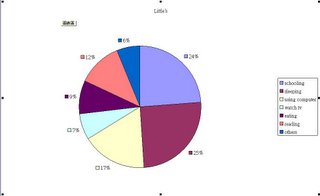Summarizing(2)
Yang Ling-yuan/tr. by Minn Song 2005/8
TEXT:
This form of compulsive dieting did, as expected, enable her to steadily lose weight. In order to slim down faster, each day she also exercised vigorously such as by performing more than 100 sit-ups and running around an athletic field. On many nights, Hsiao-Chen was roused from slumber by her hunger, and the pangs would keep her from returning to sleep. However, when she saw the numbers drop a little on the weight scale, all the suffering she had endured seemed as nothing.
Three years of continual dieting and Hsiao-chen was down to 40 kilograms. But she did not feel tired, but only that her body was light and full of energy, while her classmates expressed their envy. Hsiao-chen still thought this was not enough, hoping she could keep her weight below 40 kilos. She therefore went further and only chewed but did not swallow her food. After two years, when her height was 161 centimeters, she weighed only 30 kilograms, and was suffering from severe depression. On several occasions, she tried to harm herself by slitting her wrists or swallowing pills. These behaviors alerted Hsiao-chen's mother that something was wrong, and she had no choice but to forcibly take her to a hospital for treatment.
When Hsiao-chen came to Chen Kuan-yu's clinic, he was shocked to see an emaciated body like that of a terminal cancer patient. He discovered that the level of potassium ions in Hsiao-chen's blood was even lower than that of severely ill patients in intensive care, putting her at risk of dying from shock at any time. After several consultations, Chen discovered that Hsiao-chen was growing up in a single-parent home, and lived in close quarters with a mother with whom she was in constant conflict. This severe emotional bind combined with her desire to lose weight had finally mutated into anorexia. Fortunately, Hsiao-chen likes food very much, and only stopped ingesting food because she feared getting fat-so that dealing with her condition did not prove to be overly problematic.
Chen first used family counseling to make Hsiao-chen's mother face her daughter's dislike of eating, while attempting to improve the rigid way the two interacted. Because Hsiao-chen often ignored her hunger too long, overate, and vomited what she ate, the very feelings of hunger and satiation had become confused. Finding it difficult to deal with food on a table, she preferred hiding out and eating alone, disliking having to dine together with other people. So Chen invited Hsiao-chen's family to share meals with other anorexics and their families, allowing Hsiao-chen to once again experience the feeling of people eating communally.
This compulsive dieting did enable her to lose weight gradually. But she wanted to slim down faster, thus, she exercised extremely every day. On many nights, she was roused from slumber by her hunger, and the pangs made her fail to return to sleep. Nevertheless, as long as her weight had dropped, she felt the suffering was nothing.
Three years passed for her continual dieting, and Hsiao-chen had only forty kilograms. But she was still full of energy and she wanted to keep her weight below forty kilograms. Therefore, she just only chewed the food and did not swallow. After two years, her weight was only thirty kilograms, and she suffered from severe depression. While Hsiao-chen tried to suicide, her mother just realized something was wrong, and the mother took her to a hospital.
When Hsiao-chen came to Chen Kuan-yu’s clinic, Chen was shocked by her emaciated body which was like a terminal cancer patient. Chen put her at risk of dying at any time, and he found that Hsiao-chen was in a single-parent family and she often conflicted with her mother. This severe emotional bind resulted from her anorexia. Fortunately, Hsiao-chen likes food originally, and she just feared getting fat, so that handling her condition could be easier.
Chen attempted to improve the interaction between Hsiao-chen and her mother by family counsel. Because Hsiao-chen’s very feelings of hunger and satiation was confused, and Chen found she had difficulty to had food on a table with other people. So Chen invited Hsiao-chen’s family and other anorexics with their families, letting Hsiao-chen could experience eating communally once again.
After several courses of therapy, now, Hsiao-chen appears to have her anorexia under control, and she could overcome the disharmony with her mother and develop partial autonomy. Also, her weight has been up to about forty-six kilograms.




